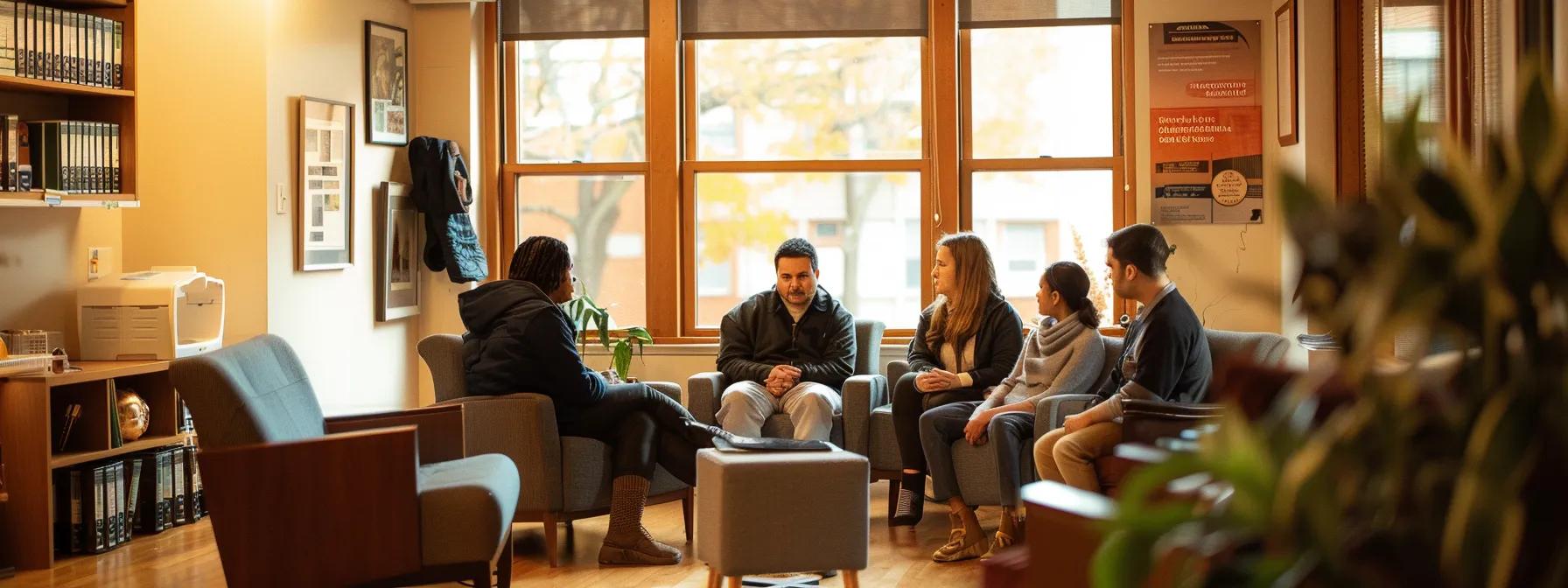Table Of Contents:
- Top Benefits of Choosing Massachusetts for Addiction Recovery
- Access a Spectrum of Leading Addiction Recovery Programs in Massachusetts
- Benefit From Massachusetts’s Strong Support Systems for Lasting Sobriety
- Find Healing in Diverse and Accessible Massachusetts Settings
- Receive Tailored Care Through Specialized Massachusetts Addiction Recovery Approaches
- Understand Massachusetts Insurance Coverage for Addiction Treatment
- Build a Foundation for Long-Term Wellness With Massachusetts Aftercare Resources
- Frequently Asked Questions
Top Benefits of Choosing Massachusetts for Addiction Recovery
In Massachusetts, individuals seeking addiction recovery enter a supportive environment that helps rebuild their lives. Renowned treatment centers, strong family and community support, diverse settings, nbk64815 and specialized care approaches enable personalized recovery journeys that address the multifaceted nature of addiction. Residents access treatment options ranging from inpatient and outpatient programs to medically supervised detoxification services, ensuring each person finds the care that meets their needs. Emphasizing evidence-based therapies and holistic practices, Massachusetts programs promote long-term sobriety through compassionate care and tailored treatment plans. Many centers also work with individuals facing co-occurring mental health disorders to ensure integrated treatment that enhances recovery. For more information on national approaches to addiction recovery, additional resources can be found at samhsa.gov.
Massachusetts’ recovery landscape supports clinical treatment while offering a robust network of peer support, family services, and community-based aftercare. This continuum of care reduces relapse risks and fosters independence and improved quality of life. Geographic diversity—with both urban facilities and peaceful rural settings—underscores the state’s commitment to accessible, therapeutic spaces. With state-funded resources, sliding-scale fee programs, and extensive insurance coverage, financial burdens do not impede treatment. Massachusetts is an ideal hub for overcoming substance abuse, providing a comprehensive support system that promotes lasting wellness and reintegration into society.
This article explores top addiction recovery programs in Massachusetts, outlines support systems that underpin lasting sobriety, details diversified treatment settings, explains specialized recovery approaches, clarifies insurance coverage for addiction treatment, and presents valuable aftercare resources to build a strong foundation for long-term wellness.
Access a Spectrum of Leading Addiction Recovery Programs in Massachusetts
Massachusetts offers a broad range of programs addressing diverse substance use disorders. The state hosts both inpatient and outpatient programs that use evidence-based methods—such as Cognitive Behavioral Therapy (CBT), Dialectical Behavioral Therapy (DBT), trauma-focused therapy, and Medication-Assisted Treatment (MAT)—designed to meet clients wherever they are in their recovery.
Locate Comprehensive Inpatient Addiction Recovery Programs in Massachusetts
Inpatient programs provide a structured, residential environment with round-the-clock medical and therapeutic support. These centers typically offer individual counseling, group sessions, and holistic wellness activities over stays ranging from a few weeks to several months, depending on disorder severity. The controlled setting helps healthcare professionals assess clients and adapt dynamic treatment plans. Many programs also include family counseling to address systemic factors in addiction. Overall, inpatient care forms a cornerstone for lasting recovery and behavioral change.
Consider Flexible Outpatient Addiction Recovery Programs in Massachusetts
For those unable to commit to residential treatment due to work or family responsibilities, outpatient programs offer a flexible alternative. Clients attend structured therapy sessions, educational workshops, and consultations with addiction specialists while managing daily life. Outpatient care often serves as a transitional phase after intensive inpatient treatment, allowing clients to practice new coping strategies in real-world settings. Personalized outpatient programs have been shown to contribute significantly to sustained sobriety by adapting to individual schedules and demands.
Engage in Evidence-Based Therapies Within Massachusetts Programs
Evidence-based therapies form the backbone of Massachusetts recovery initiatives. Programs integrate CBT to reframe negative thoughts and DBT to boost emotional regulation, while trauma-focused therapy addresses past adverse events linked to substance use. Continuous updates based on current clinical research ensure that treatment methods remain state-of-the-art. These approaches not only improve mood and behavior quickly but also provide long-term strategies for managing triggers and preventing relapse.
Discover Holistic Approaches in Massachusetts Addiction Recovery
Many recovery centers complement conventional therapies with holistic approaches that consider emotional, physical, and spiritual health. Techniques such as mindfulness meditation, yoga, acupuncture, and nutritional counseling help clients build inner balance and resilience. Incorporating these practices can reduce anxiety, improve sleep, and enhance mental clarity. Holistic care supports sustainable habits for long-term health while complementing standard treatments.
Find Medically Supervised Detoxification Services in Massachusetts
Detoxification is often the initial step in recovery, especially for substances with severe withdrawal symptoms. Medically supervised detox centers in Massachusetts ensure a safe, monitored process to clear toxins while stabilizing the patient for further treatment. With continuous monitoring, necessary medications, and supportive care, these centers help minimize withdrawal complications and build a strong foundation for recovery.
Benefit From Massachusetts’s Strong Support Systems for Lasting Sobriety

Robust support systems extend recovery beyond clinical treatment. Massachusetts is known for its network of peer support groups, state-funded initiatives, and family-focused programs that ensure ongoing accountability and encouragement long after active treatment.
Connect With Peer Support Groups Across Massachusetts
Peer support groups offer a space where individuals share experiences and challenges with those who understand recovery. Whether through 12-step programs or alternative peer-led meetings, these groups boost emotional support, self-esteem, and practical advice. Research indicates that active participation in such groups significantly enhances long-term sobriety and helps reduce feelings of isolation.
Utilize State-Funded Recovery Resources and Initiatives
State-funded resources in Massachusetts play a pivotal role in making treatment accessible. Initiatives include public health campaigns, subsidized treatment options, and educational resources designed to inform the public about substance abuse and support systems. These programs reduce financial and logistical barriers, ensuring quality care for individuals regardless of income.
Engage Family Support Services Within Massachusetts Treatment Plans
Family support services are integral to recovery in Massachusetts. Many centers provide counseling and education for family members to help them understand addiction, improve communication, and develop effective coping strategies. Involving families in the treatment process helps rebuild trust and strengthens the support network essential for sustained recovery.
Access Community Reinforcement Approaches in Massachusetts
Community Reinforcement Approaches (CRA) help reshape clients’ lifestyles by encouraging engagement in rewarding, non-substance-related activities. CRA programs include vocational training, recreational activities, and skill development initiatives that foster positive social connections. By replacing the reinforcement of substance use with constructive behaviors, CRA models support improved quality of life and long-term recovery.
Explore Sober Living Environments Throughout Massachusetts
Sober living environments, often known as sober houses or recovery residences, offer critical aftercare support. These settings provide a structured, substance-free living space with peer support, regular drug testing, and life skills workshops. Sober living environments not only ensure immediate safety but also help residents build independence and maintain recovery momentum.
Find Healing in Diverse and Accessible Massachusetts Settings
A key strength of Massachusetts’ recovery services is the variety of treatment settings available, tailored to different lifestyles and needs.
Choose Urban Addiction Recovery Programs in Massachusetts for City Access
Urban recovery centers, located in cities like Boston, Worcester, and Springfield, offer easy access to additional healthcare services, cultural activities, and professional networks. Designed for individuals who thrive in fast-paced environments, these centers provide specialized, research-based treatments along with abundant mental health and support services. Urban centers also benefit from strong connections with local governments and community organizations, aiding faster reintegration into society.
Select Coastal or Rural Massachusetts Locations for Tranquil Recovery
For those seeking a quieter environment, coastal and rural settings provide serene surroundings that promote mindfulness and stress reduction. These programs often incorporate outdoor activities—such as hiking, meditation by the sea, and therapeutic gardening—to enhance mental clarity and overall well-being. The natural tranquility of these settings helps foster self-reflection and personal growth, contributing to long-term sobriety.
Appreciate Proximity to Nature and Recreational Activities for Therapeutic Benefit
Many programs in Massachusetts integrate recreational and nature-based therapies. Proximity to parks, coastlines, and nature reserves encourages participation in yoga, hiking, and meditation, which enhance physical health and serve as effective tools for stress management. Regular physical activity in natural surroundings boosts mood, improves cognitive function, and reinforces recovery through a holistic blend of therapy and leisure.
Evaluate Transportation Options to Massachusetts Recovery Centers
Reliable transportation is crucial for consistent treatment attendance. Massachusetts recovery centers are strategically located near public transit and major highways. Many programs offer shuttle services or partner with rideshare companies to ensure clients can attend sessions without logistical barriers, supporting steady engagement in the recovery process.
Experience Culturally Sensitive Addiction Recovery Programs in Massachusetts
Reflecting the state’s diverse population, Massachusetts recovery programs offer culturally sensitive treatment options. Providers incorporate language support and tailor therapies to respect cultural identities and values. This approach improves engagement and trust, ensuring that every client receives respectful, personalized care.
Receive Tailored Care Through Specialized Massachusetts Addiction Recovery Approaches

Specialized treatment is crucial since substance use disorders often overlap with other mental health challenges and social issues. Massachusetts programs offer tailored care to address co-occurring disorders, gender-specific needs, age-related concerns, and specific substance dependencies.
Identify Programs for Co-Occurring Disorders in Massachusetts
Many centers offer dual diagnosis treatment that addresses both substance abuse and concurrent mental health issues such as depression, anxiety, bipolar disorder, or PTSD. By combining pharmacotherapy, psychotherapy, and behavioral counseling, these programs treat interrelated conditions holistically, enhancing overall recovery outcomes and reducing relapse risk.
Seek Gender-Specific Addiction Recovery Programs in Massachusetts
Gender-specific programs address the unique challenges faced by men and women. Women’s programs may focus on trauma-informed therapies and address caregiving pressures, while men’s programs often tackle societal pressures and emotional expression. Tailored gender-specific care has been shown to improve treatment retention and outcomes.
Find Age-Appropriate Treatment for Young Adults and Other Groups
Different age groups face distinct challenges in addiction recovery. Massachusetts offers age-appropriate programs that consider developmental needs—addressing issues like identity formation and peer pressure for young adults, and chronic health conditions for older adults. Tailoring treatment to age-related needs helps ensure that therapy is relevant and engaging.
Address Specific Substance Dependencies With Targeted Massachusetts Programs
Treatment for substance dependencies is customized to the specific effects and patterns associated with each drug, such as alcohol, opioids, methamphetamine, benzodiazepines, and prescription drugs. For example, opioid treatments often include Medication-Assisted Treatment (MAT) with agents such as buprenorphine or methadone integrated with counseling. Tailored interventions help address both physiological withdrawal and psychological triggers for better recovery outcomes.
Participate in Trauma-Informed Care Within Massachusetts Recovery Settings
Trauma-informed care is essential for clients whose substance abuse stems from past traumatic experiences. Massachusetts programs adopt approaches that integrate mindfulness, art therapy, and narrative therapy to help clients process trauma safely. These methods, along with well-trained staff committed to a respectful environment, empower clients and significantly improve recovery outcomes.
Understand Massachusetts Insurance Coverage for Addiction Treatment
Financial concerns can hinder recovery. In Massachusetts, diverse insurance programs—including private health insurance, MassHealth, and state-funded initiatives—ease access to comprehensive care by offering sliding scale fees and financial assistance.
Verify Your Insurance for Massachusetts Addiction Recovery Programs
Clients are encouraged to verify their insurance policies to determine coverage for addiction recovery services. Many centers accept major insurers such as Aetna, Blue Cross Blue Shield, and Medicaid. Early verification of coverage details, including limits and deductibles, can help avoid unexpected expenses and streamline enrollment.
Learn About MassHealth Options for Substance Abuse Care
MassHealth, the state’s Medicaid program, provides extensive coverage for detoxification, inpatient and outpatient treatment, counseling, and aftercare support. This safety net supports low-income individuals and families, reducing the financial burden of treatment.
Identify Massachusetts Programs Offering Sliding Scale Fees or Financial Aid
Many centers offer financial aid and sliding scale fees based on income to ensure affordability. Financial assessments are conducted during intake, and clients may also receive assistance with job placement or housing after treatment. This approach promotes equity in access to recovery services.
Obtain Assistance With Navigating Financial Aspects of Recovery
Financial counselors and case managers help clients navigate treatment costs, manage budgeting, and secure available financial aid. This guidance allows clients to concentrate on recovery without the stress of monetary concerns.
Clarify Out-of-Pocket Expenses for Massachusetts Treatment
Many centers provide upfront consultations to explain potential out-of-pocket costs, including co-pays, deductibles, and services not covered by insurance. Transparent communication regarding expenses helps reduce anxiety and fosters trust between clients and providers.
Build a Foundation for Long-Term Wellness With Massachusetts Aftercare Resources

Aftercare is a vital stage of recovery as clients transition back to everyday life. Massachusetts offers comprehensive aftercare resources—including ongoing counseling, vocational training, alumni programs, and relapse prevention education—to reinforce gains made during treatment and support long-term sobriety.
Develop a Continuing Care Plan With Massachusetts Providers
Providers work closely with clients to create individualized continuing care plans that include scheduled follow-ups, counseling sessions, and periodic check-ins. These plans focus on early intervention and relapse prevention, offering a structured ongoing relationship that promotes long-term success.
Join Alumni Programs From Massachusetts Recovery Centers
Alumni programs provide a structured network for former clients to share experiences, celebrate victories, and receive ongoing support. Regular meetings, social events, and career development workshops help maintain recovery momentum and reduce isolation.
Access Relapse Prevention Education in Massachusetts
Specialized educational sessions help clients identify relapse triggers, develop effective coping strategies, and understand relapse warning signs. These interactive workshops and mindfulness training sessions empower clients to maintain sobriety long term.
Secure Vocational Training and Employment Assistance Post-Treatment
Vocational training and employment assistance programs help clients acquire new skills, rebuild self-esteem, and secure stable jobs—critical elements for financial independence and sustained recovery.
Engage in Ongoing Counseling and Therapy Services in Massachusetts
Extended counseling, including individual and group sessions, offers continuous professional guidance as clients navigate daily challenges and potential stressors. Ongoing therapy builds resilience and reinforces healthy behaviors, contributing to longer periods of sobriety and overall satisfaction with the recovery process.
Frequently Asked Questions
Q: What distinguishes Massachusetts addiction recovery programs from those in other states?
A: Massachusetts programs offer a comprehensive range of treatment options—including inpatient, outpatient, and medically supervised detox—integrated with evidence-based and holistic therapies. Strong public funding, research-driven methodologies, and accessible insurance options make treatment here highly personalized and effective.
Q: How do Massachusetts programs address co-occurring disorders during treatment?
A: Many centers offer dual diagnosis treatment that combines pharmacotherapy, targeted psychotherapy, and continuous monitoring to treat both mental health issues and substance abuse together, thus enhancing overall recovery outcomes.
Q: Are there affordable treatment options in Massachusetts for those without private health insurance?
A: Yes, state-funded programs like MassHealth along with sliding scale fee options and financial counseling ensure that low-income individuals receive comprehensive care without prohibitive costs.
Q: What role do family support services play in Massachusetts addiction recovery?
A: Family support services help rebuild trust and improve communication. Counseling sessions educate family members about addiction, creating a supportive home environment and reinforcing the client’s recovery.
Q: How do aftercare programs in Massachusetts help prevent relapse?
A: Aftercare programs provide ongoing counseling, vocational training, and alumni support, while emphasizing relapse prevention education to help clients recognize triggers, develop coping strategies, and maintain a stable, independent life.
Q: What transportation options are available for clients attending treatment in Massachusetts?
A: Recovery centers are strategically located with accessible public transit, shuttle services, and rideshare partnerships to minimize transportation barriers and support consistent engagement in treatment.
Q: How is culturally sensitive care incorporated into Massachusetts addiction recovery programs?
A: Programs employ diverse staff, offer language support, and tailor therapies to respect cultural customs and values, ensuring that all clients receive respectful and personalized care.
| Program Type | Key Service Offered | Benefit | Typical Duration |
|---|---|---|---|
| Inpatient Recovery | 24/7 medically supervised care | Intensive focus on recovery, reduced relapse | 4–12 weeks |
| Outpatient Recovery | Flexible therapy sessions | Maintains daily life with continuous care | 3–6 months or more |
| Medically Supervised Detox | Safe withdrawal and stabilization | Minimizes withdrawal complications | 1–2 weeks |
| Dual Diagnosis Treatment | Integrated mental health and addiction care | Addresses co-occurring disorders effectively | Varies per individual |
| Holistic Recovery Programs | Mindfulness, yoga, nutritional support | Enhances emotional balance and wellness | Ongoing/Customized |
| Peer Support and Alumni Programs | Group therapy and community meetings | Provides long-term accountability and support | Ongoing |
| Vocational Training & Employment Aid | Job skills training and career counseling | Facilitates financial independence | Typically post-treatment |
The table above summarizes the various types of addiction recovery programs available in Massachusetts, highlighting key services, benefits, and typical durations. These options work together to build lasting sobriety by combining clinical excellence with robust aftercare services. By understanding these choices, clients can navigate the recovery landscape more effectively and select a program that best suits their personal recovery goals.
Each element of Massachusetts’ addiction recovery framework—from specialized treatment to comprehensive aftercare—demonstrates a commitment to patient-focused, evidence-based care. This approach addresses immediate substance abuse challenges while laying the groundwork for a thriving, independent future. With innovative programs, accessible insurance options, and strong community networks, individuals in Massachusetts are well-positioned to overcome addiction and embrace a healthier, more fulfilling life.



